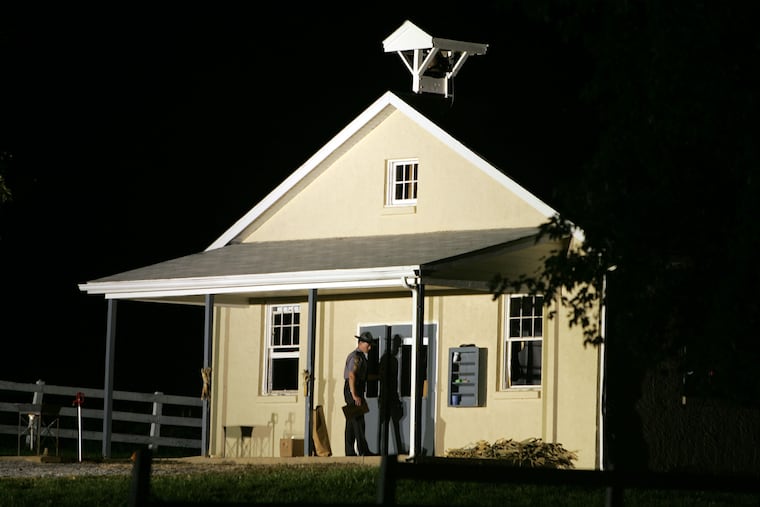Amish woman wounded in schoolhouse shooting dies 18 years later: ‘They changed her life with bullets’
Rosanna S. King, 23, died at her home in rural Lancaster County, 18 years after she was severely wounded in the shooting at West Nickel Mines Amish School.

Rosanna S. King, 23, died at her home in rural Lancaster County on Tuesday — 18 years after she was severely wounded in the 2006 Pennsylvania schoolhouse massacre that rattled the local Amish community. Her cause of death was not immediately confirmed.
When King was 6 years old, Charles Carl Roberts IV, a 32-year-old milk truck driver — who was not of Amish faith — barricaded himself inside the West Nickel Mines Amish School, lined up the children and teachers, and shot 10 students execution-style. He killed five girls and wounded five more, including King, before taking his own life as police closed in.
King, who was shot in the head, wasn’t expected to survive. Doctors told her parents they couldn’t do anything. Two days after the shooting, she was taken off life support at Hershey Medical Center at her family’s request and sent home to recover.
“We took her home to die,” her father, Christ King, recalled to The Inquirer in a 2011 interview. But his daughter held on.
Rosanna King’s condition would improve, but she was still considered the most severely injured survivor, with significant brain trauma, unable to talk, using a reclining wheelchair, and fed through a tube, according to archival reports. She would also suffer from severe seizures, community members told The Inquirer.
Still, there were signs of a life, and even joy. She was responsive, recognized family members, smiled “big smiles,” laughed, cried, and was mentally alert, her father told reporters in 2013. Following the news of her death, some neighbors, in condolences on social media, said they’d see her outside in her wheelchair with family members.
The Amish commonly avoid modern communications — including interacting with the media — but over the years members of the community have agreed to speak with reporters about the shooting and its effects in response to the public’s support. They prioritize their deep Christian faith and family life, eschewing many modern conveniences.
“Typically, the Amish don’t want big publicity,” said Jake King (no relation to Rosanna), a past board member of the Nickel Mines Accountability Committee — a volunteer committee that manages funds sent to support the shooting’s survivors and loved ones. “[But] I think the public has right to interest in what’s going on. Some of the younger generation don’t even know about the Nickel Mines happenings because it happened so long ago.”
Rosanna’s father, who could not be reached for comment as of publication time, has said in past interviews that the aftermath of the West Nickel Mines Amish School shooting — which became a major national news story and inspired a Lifetime movie — and the abrupt spotlight it put on their small rural community pushed him and other community members to comfort other groups afflicted by violence over the years.
In 2007, he was among the emissaries who visited with grieving families at Virginia Tech. A year later, he and his wife met with an Israeli couple whose daughter was killed by a suicide bomber in Tel Aviv.
“We have a more in-depth feeling of empathy for other people in grief-stricken situations,” Christ King told The Inquirer in 2011.
Rosanna King’s story also resonated with those who were previously unfamiliar with the Amish community. Richard Egan, a retiree from Northeast Philadelphia who helped fundraise for the community in the wake of the shooting, called meeting the little girl “one of the turning points” of his life.
The now-87-year-old was in his early 70s when he was invited to meet the family in response to his outreach.
“She couldn’t talk, but you could see that whatever I was saying, she embraced it,” Egan told The Inquirer Friday. “They took me into the house and showed me her bedroom and everything they had. This poor girl — they changed her life with bullets.”
Since meeting Rosanna King, Egan said he’s maintained a relationship with the Amish in the Lancaster area. Despite his own health issues, he still sends checks annually to the Nickel Mines Accountability Committee, which continues to meet every two months. Egan also included the fund in his will.
“It’s been a life-changing experience for me,” he said. “It’s important that the public knows that [Rosanna] passed away.”
Immediately following the shooting, the Amish forgave the schoolhouse shooter — even attending his funeral — and embraced his surviving family, including the shooter’s mother, Terri Roberts.
With King requiring constant care, Terri Roberts became one of her caretakers, spending time with her weekly, bathing her, singing to her, and reading her passages from the Bible and Anne of Green Gables.
In a 2013 interview with the Associated Press, Roberts said the weekly visits forced her to grapple with the damage her son caused. But she also found peace in knowing she could give King’s family some relief. Roberts wrote a book about her experience titled “Forgiven,” in which she dedicates a chapter to her relationship with Rosanna.
“Her family is amazing in the measures that they go to make life as good as it can be for Rosanna,” Roberts told Lancaster Online in 2016. “I think her parents have just surrendered this to the Lord.”
Terri Roberts died in 2017 from complications related to breast cancer.
An obituary from Furman Home for Funerals in Leola said King is survived by her parents, Christ and Mary Elizabeth King, along with five siblings and other family. A service was held Friday at Bart Cemetery in Georgetown.
Contributions to the fund for the Nickel Mines victims can be sent to the Nickel Mines Accountability Committee, 959 Georgetown Rd., Paradise, PA 17562.